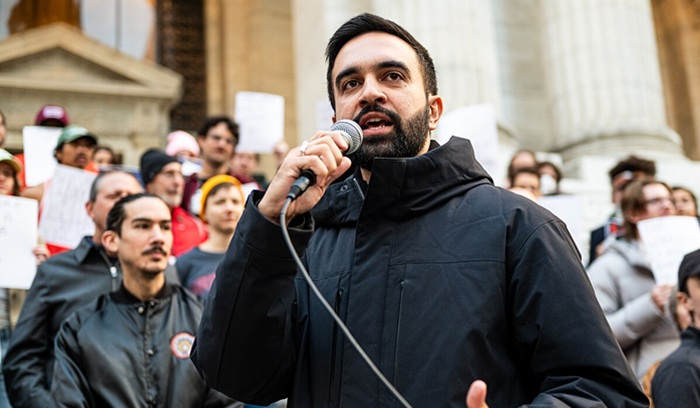Zohran Mamdani’s election as the first Muslim Mayor of New York City marks a powerful and historic moment for American democracy. This victory signals a decisive shift toward embracing diverse, progressive leadership in the nation’s largest metropolis. Mamdani, who won on a platform focused on housing, transportation, and economic justice, embodies the city’s tradition of upward mobility and inclusive politics. His win is a triumph for community organizing and a powerful affirmation that the city is committed to equitable representation.
The election results highlight the growing political power of diverse coalitions. They show that a message focused on social equity and economic reform can resonate deeply with a broad, multi-ethnic electorate.
Elevating Marginalized Voices in Governance
The most significant good news of this election is the breakthrough for representation. Mamdani’s identity as a Muslim and his background as a son of immigrants provide a long-overdue voice in city governance. This visibility at the highest level of city government offers a powerful source of inspiration for young people from marginalized communities worldwide. It proves that there are no ceilings in American political life.
His victory brings a necessary perspective to policy discussions. Mamdani has centered his platform on issues directly affecting working-class families and immigrants. His commitment ensures that city policies will be designed through a lens of equity, addressing systemic issues like housing affordability and job security. This focus on the needs of all residents strengthens the legitimacy of city governance.
A Mandate for Equitable Policy and Reform
Mamdani ran on a platform that secured a strong mandate for progressive reform. His victory is a testament to the effectiveness of local, grassroots political movements. He prioritized tangible solutions for complex urban challenges. For example, his proposals focused on expanding tenant rights and investing in public transportation.
The new administration is expected to accelerate public investment in social infrastructure. This will lead to positive changes in areas like public housing and healthcare access. This commitment to equitable distribution of city resources helps close disparity gaps. It builds a more resilient and inclusive economic future for all New Yorkers. For background on the city’s focus on inclusive housing policies, the New York City Mayor’s Office of Housing Recovery Operations provides useful context.
Strengthening Civic Engagement and Community Organizing
This election outcome is a major success for civic engagement and community organizing. Mamdani’s campaign leveraged the energy of local activists and first-time voters. This demonstrates the power of bottom-up politics. The mobilization of diverse communities ensures sustained political participation beyond the election cycle itself.
This vibrant engagement strengthens the overall health of the city’s democracy. It provides a model for how progressive ideas can achieve mainstream success through grassroots coalition-building. This victory inspires young progressives across the nation to organize and compete for political leadership at every level. The Brennan Center for Justice often highlights the importance of inclusive voting and democratic participation in urban environments.
A Legacy of Inclusivity and Global Influence
New York City’s decision to elect its first Muslim Mayor sends a profound message of inclusivity to the world. As a global city, New York often sets precedents for cultural and political acceptance. This election affirms the city’s identity as a welcoming sanctuary for all people. This is particularly significant in a world grappling with issues of immigration and religious identity.
Mamdani’s historic achievement will undoubtedly influence the political trajectory of other major global cities. It proves that diversity in leadership is a source of strength, innovation, and democratic vitality. The Schomburg Center for Research in Black Culture provides context on the long history of social justice movements that paved the way for this moment. The National Congress of American Indians (NCAI) provides a model for how sovereignty and governance are pursued by historically marginalized groups.
Resources
- New York City Mayor’s Office of Housing Recovery Operations on Inclusive Housing Policies
- Brennan Center for Justice on Democratic Participation
- Schomburg Center for Research in Black Culture on Social Justice Movements
More Good News
-

Senegal launches all-electric bus network powered by renewable energy
Senegal has successfully launched a transformative Bus Rapid Transit system in Dakar, featuring a fleet of 121 fully electric buses. As the first network in Sub-Saharan Africa to operate entirely on renewable energy, the initiative utilizes local solar power to transport up to 300,000 passengers daily. By utilizing dedicated lanes, the clean energy fleet cuts cross-city commute times in half while preventing nearly 60,000 tons of carbon dioxide emissions annually. This monumental project dramatically improves urban air quality and establishes Senegal as a pioneering leader in sustainable, green public infrastructure.
-

Yangtze River showing remarkable ecological recovery following fishing ban
China’s Yangtze River is experiencing a remarkable ecological revival five years into a sweeping ten-year commercial fishing ban. Recent surveys reveal significant increases in overall fish biomass and the heartening return of critically endangered species in the world’s fifth largest river. Furthermore, thousands of former commercial fishers have been successfully transitioned into new roles as official river guardians. This massive conservation effort offers a hopeful, replicable model for global freshwater restoration.
-

Rob Jetten becomes The Netherland’s first openly gay prime minister
In a historic victory for representation and progressive politics, Rob Jetten has been sworn in as the first openly gay Prime Minister of the Netherlands. At 38 years old, the centrist Democrats 66 leader is also the youngest head of government in Dutch history. Jetten successfully formed a minority coalition government following a tense election that defeated far-right populist opponents. His platform prioritizes climate investment, economic fairness, and strong international collaboration. Jetten’s premiership powerfully reaffirms the Netherlands’ global legacy as a pioneer of LGBTQ+ equality and inclusive, cooperative democratic leadership.
-

Millions of New York City workers gain additional time off through new law
Millions of workers in New York City are benefiting from a major expansion of the Protected Time Off Law, which officially took effect in late February 2026. The progressive legislation grants employees an additional 32 hours of unpaid, protected leave that is available immediately upon hire or at the start of the calendar year. This ensures workers do not have to wait to accrue hours before addressing sudden medical emergencies or family crises. The law also vastly expands permitted uses to include mental health care, public disaster recovery, and caring for disabled loved ones.
-

Malaysia bans electronic waste imports to protect the environment and public health
In a monumental victory for public health and environmental justice, Malaysia has enacted an immediate and absolute ban on the importation of electronic waste. By removing regulatory loopholes and launching a strict enforcement campaign, the nation is successfully preventing toxic heavy metals from polluting its soil and waterways. Authorities have already intercepted hundreds of thousands of kilograms of illegal e-waste at major ports, vowing to return the hazardous materials to their countries of origin. This decisive action establishes Malaysia as a leading force in Southeast Asia’s growing movement to reject global waste and prioritize ecological sustainability.
